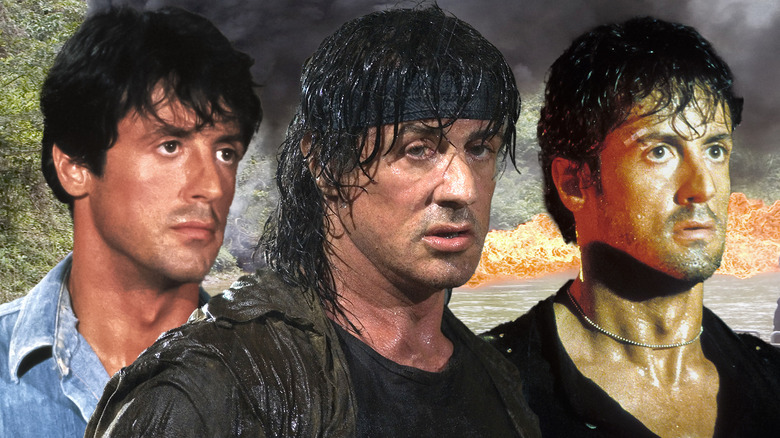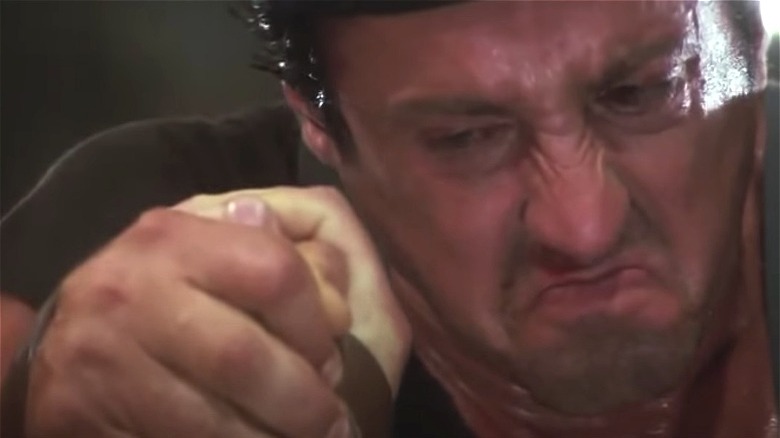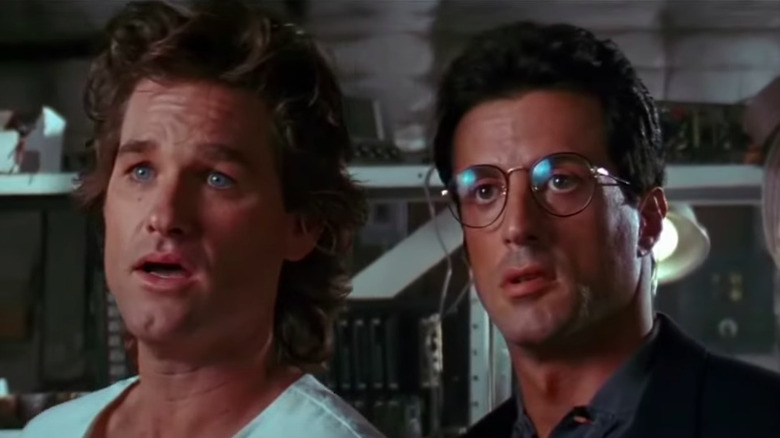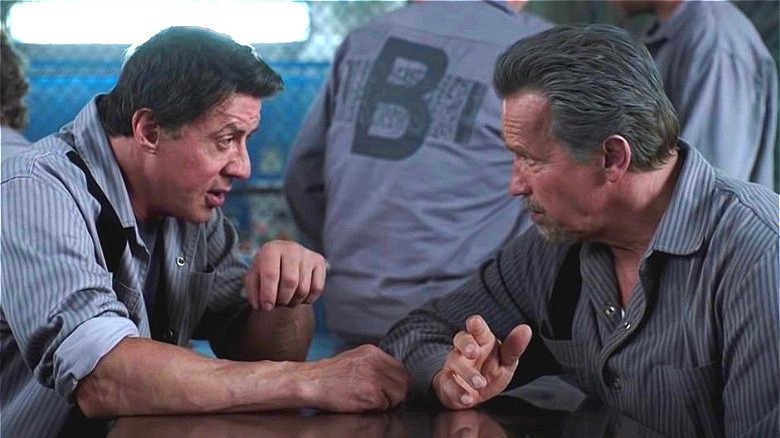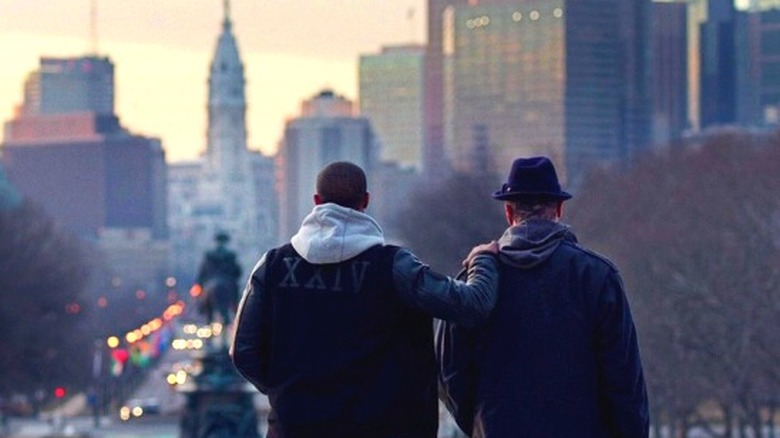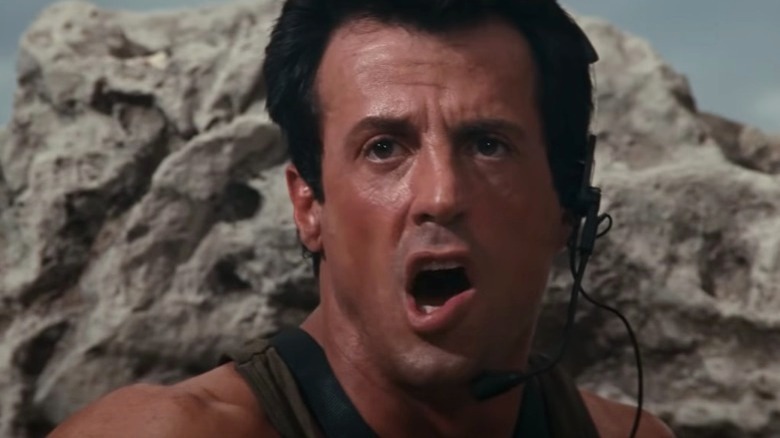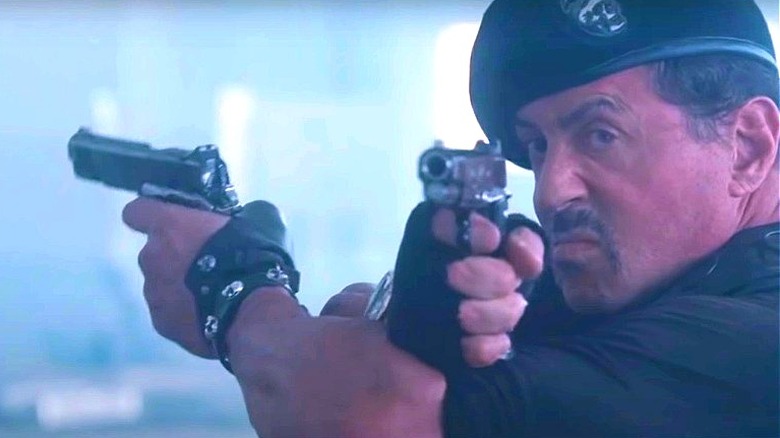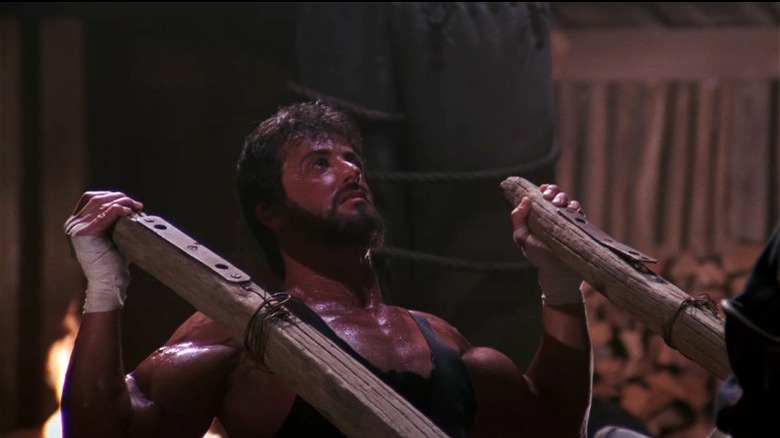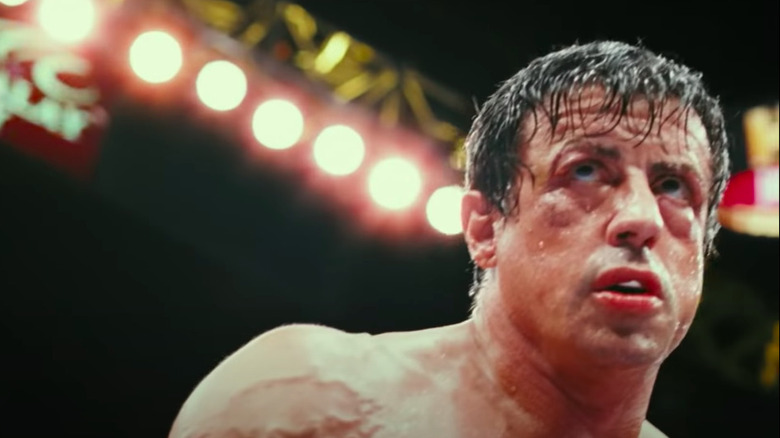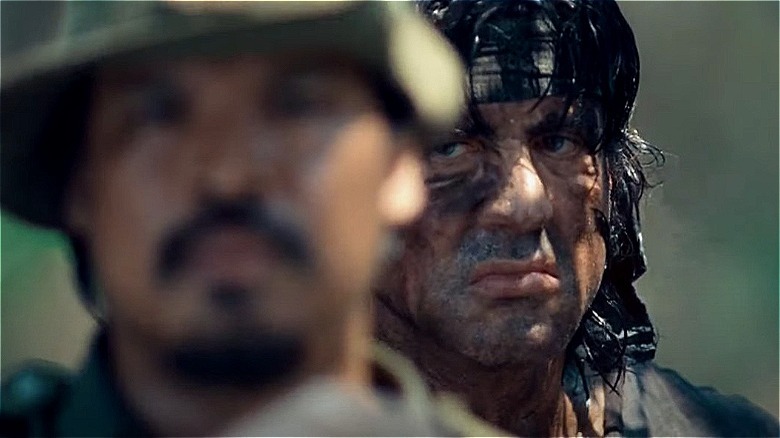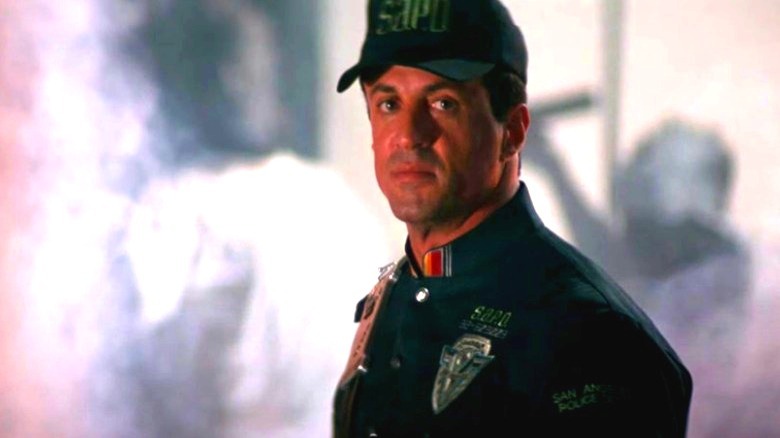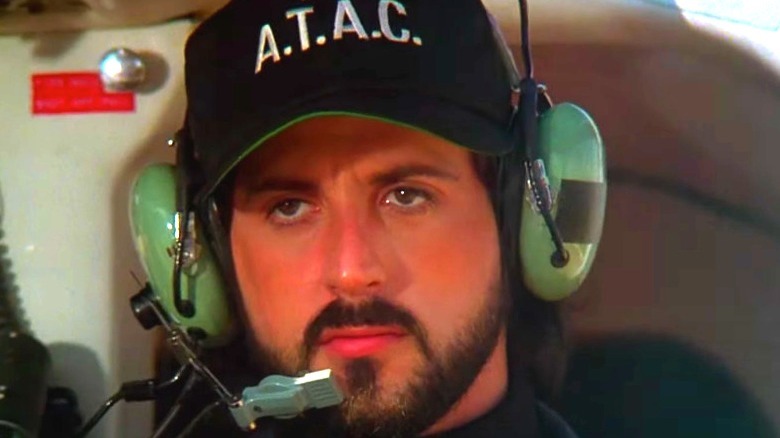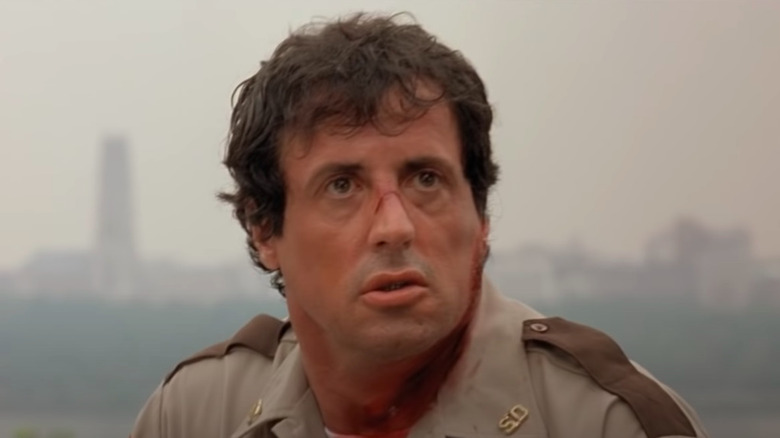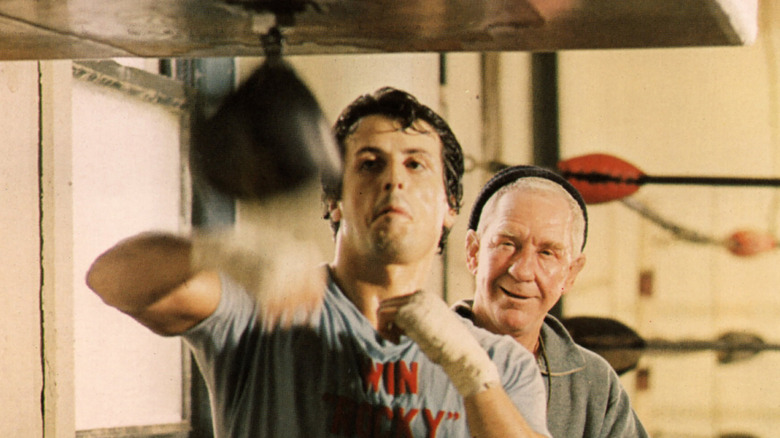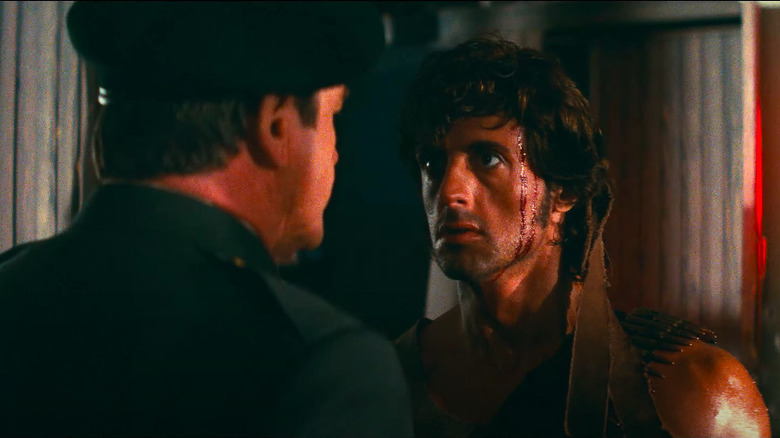14 Best Sylvester Stallone Films, Ranked
Sylvester Stallone has been a fixture of pop culture for some 50 years, and it began with "Rocky," one of Hollywood's biggest success stories. That is not hyperbole. Stallone wrote a script that took him from obscurity and made him an Oscar-nominated actor and writer with instant star power and a few million in the bank.
Hopes were high for Stallone. Roger Ebert, for instance, wrote that the young actor reminded him of Marlon Brando, who had played a journeyman fighter in "On The Waterfront." However, thanks to mindless vanity pieces like "Cobra" and "Rambo: First Blood Part II," it wouldn't be long before such a comparison was viewed with derision.
Still, people shouldn't forget what made Stallone a success from 1976 to 1982, during which he proved himself as an actor of intelligence, naturalism, and heart. A mixture of ego and '80s commercialism reoriented his dramatic foundation throughout the rest of the decade, but that didn't mean his talents couldn't work as popcorn entertainment. So, from "Rocky" to "Rambo" and all the highlights in between, here are the 14 best Sylvester Stallone films, ranked.
14. Over the Top
I recommend "Over the Top" with some major caveats. Frankly, it is a film awash with gooey sentimentalism and Stallone is out-acted by a child, yet these 93 minutes of peak 1980s are about the only mainstream exposure the sport of arm wrestling has ever got. Stallone stars as the comically named Lincoln Hawk, a long-distance truck driver and semi-professional arm wrestler who wants nothing more than to be a father to his estranged son Michael (David Mendenhall), an officiously mannered cadet who lives with his wealthy grandfather Jason (Robert Loggia).
Jason thinks that Lincoln is a bum who will corrupt his plan for Michael, which is an elite education followed by a life of whatever it is that makes the old man so damn rich. "Booo" is our reaction to that, because what Michael really needs is Lincoln's plucky, all-American spirit.
I could go on from here, but I suspect you extrapolated the plot a few sentences ago. What I will say is that Mendenhall gives a very confident performance and has much more range than Stallone, who dulls their chemistry with his rather blank demeanor. No one watches "Over the Top" for its acting, though; they watch it to see Stallone, slick with aesthetic sweat, pin his opponent's hand to the table while roaring with that distinctive slanted expression of his.
13. Tango and Cash
"Tango and Cash" rode the buddy cop trend that started with "48 Hrs." back in 1982, but this film shares more in common with "Lethal Weapon," starring Mel Gibson as the young loose cannon and Danny Glover as his curmudgeonly partner. In "Tango and Cash," Mel Gibson is replaced by Kurt Russell, who, as Gabe Cash, is a typical boor with a flair for "enhanced interrogation." Stallone plays against type somewhat as Ray Tango, a lieutenant from Beverly Hills PD whose urbane brand of machismo is at odds with Cash's barroom brawler shtick.
These ludicrously named characters are nothing new, but Stallone and Russell make for an adequate duo, especially when they toy with Requin, a Cockney gangster played by the decidedly American Brion James, whose accent is of the pantomime variety, but enjoyable in an action film this lightweight.
There are even some meta touches. "He thinks he's Rambo!" shouts one officer, mocking Tango for showboating and incompetence during an elaborate truck stop. "Rambo's a p***y," Tango replies, shooting the truck's tanker and revealing a stash of cocaine. In another scene, Tango responds to a convict's taunt with, "I loved you in 'Conan the Barbarian'!" before hitting his face against the jail cell bars. The joke is that Arnold Schwarzenegger, Stallone's arch-rival, looks like Robert Z'Dar, whose distinctive face was a result of cherubism.
12. Escape Plan
This was a shared top billing about 25 years in the making. Stallone and Schwarzenegger were too competitive for it to happen in the 1980s or 1990s, but they mellowed with age and by 2013, deep into their seventh decade, Arnie and Sly finally came together.
Stallone is Ray Breslin (about the third or fourth "Ray" of his career by this point), an undercover prison break specialist who tests "maximum incarceration" facilities across the country. Laser-focused and acutely observant, it seems that no balls, chains, bars, or walls can contain this man. But then, for reasons that aren't worth much consideration, Ray is thrown into a rogue sea prison led by Hobbes (Jim Caviezel), who assures our hero that he will never escape. However, the warden didn't count on Ray befriending Emil Rottmayer (Schwarzenegger), a fellow inmate, security expert, and hard case.
It's all a load of action babble and it's not what you would have hoped from Sly and Schwarzenegger's first top billing, but "Escape Plan" is still an enjoyable romp with a good helping of macho posturing.
11. Creed
"Rocky Balboa" may have disarmed most cynics with its quality and charisma, but I'm not sure if there was much appetite for a seventh installment. Seeing Rocky fight at almost 70 years of age would be a ridiculous indignity compared to the muscle-bound spectacles of the 1970s and '80s.
To avoid undoing the sixth film's course correction, the answer was not a sequel, but a spinoff in which Stallone would become the aging trainer figure. Humbling, I imagine, but like with "Cop Land," "First Blood," and the original "Rocky," vulnerability brings the best out of Stallone's acting chops.
Stallone's performance is real and lived in. He had enough time to get it right, a cynic would say, but the actor's stoic, no-frills performance is a reminder that despite all of the commercial, family-friendly stuff of the 1980s, Stallone has flair for the grizzled and the hard-boiled. If he was born 30 years earlier, perhaps he would have shared the screen with the likes of Bogart and Mitchum.
10. Cliffhanger
There isn't much use in detailing this film's plot beyond calling it "Die Hard" on a mountain. That isn't a slight but rather recognition of what "Cliffhanger" is all about — superior action sequences. So superior, in fact, that "Cliffhanger" became one of Stallone's most successful films independent of the "Rocky" and "Rambo" franchises.
Watching "Cliffhanger" is a throwback to when the action film reigned at the box office, not the Marvel Industrial Complex with its digital, PG-13 aesthetic (yes, I'm a reactionary on that subject). For those of you with a special interest in cinematic violence (most Stallone fans, I imagine), "Cliffhanger" is a hard-R action film with a notably savage streak even after the MPAA got its scissors out. If you're prepared to squint, this prehistoric VHS footage shows that director Renny Harlin intended there to be some 10 minutes of extra combat.
Still, the theatrical release is replete with squibby carnage to compliment the explosive, high-wire stunt sequences. Most sadistic, perhaps, is the "soccer" moment in which Delmar, a former British footballer played by Craig Fairbrass, lays into Michael Rooker's character Hal with the most vicious striking kicks he can muster.
Fairbrass would go on to star in the outrageous "Rise of the Footsoldier 3: The Pat Tate Story," which I encourage any American Anglophile to watch if they are interested in the vulgar depths of British exploitation cinema.
9. Expendables 2
The first "Expendables” film was a decent attempt at putting together a massive action ensemble. Sylvester Stallone corralled a broadside of heroes from the last 40 years and, as you can see in the posters, put himself as the center of gravity. I remember watching it with fairly low expectations and, because of that, had a pretty good time.
Still, it was not until the sequel that Stallone's vision came together. He gave the directorial reins to British filmmaker Simon West, who drew on his experience directing "Con Air," "Lara Croft: Tomb Raider," and, most importantly, the music video for Rick Astley's "Never Gonna Give You Up." They got an even wider cast, too, with performances from Chuck Norris, Jean-Claude Van Damme, and Arnold Schwarzenegger, who had only a cameo in the first film.
There is a plot to "The Expendables 2," something about plutonium and Cold War bases or whatever. But this is a film about spectacle, not story, and that means old men with big guns blasting the hell out of some faceless enemy. We're served this in spades throughout the film's digestible 103 minutes, especially during an airport shootout in which Stallone, Schwarzenegger, and Bruce Willis walk into battle together as the film's A-list guard. For movie fans who grew up with the trio's action films, this moment was a dream come true.
8. Rocky IV
"Rocky IV" was the first entry in the Rocky franchise to get truly trashed by critics, but the people loved it. Just look at all the stats. The YouTube highlights have millions of hits and so does the Spotify soundtrack. Yeah, it may be a propaganda film, but it is enjoyable because of that, not despite it.
You likely know the premise. Apollo Creed dies in the ring against Ivan Drago, an enormous, inhuman, and seemingly invincible Soviet boxer. "If he dies, he dies," says the Russian behemoth, indifferent to Creed's suffering. Outraged, Rocky drops everything, including his championship belt, and takes the fight to Drago. True, accusations of thin plotting are not unfounded.
Anyway, the fight is supposed to be the main event, but it is the training sequences that define this ridiculous popcorn crowd-pleaser. It begins with a thumping synth beat as Rocky and Drago wake up for a day's training and their regimens are strikingly different. Drago works the climber machine, Rocky pulls a sled full of rocks; Drago smashes the incline treadmill, Rocky climbs a mountain; Drago is injected with steroids in a laboratory with no natural light by a team of glum managers; Rocky works surrounded by snow, fire, wood, and his friends. The message is clear, America is the force of humanity here.
7. Rocky Balboa
After "Rocky V," which the BBC described as "like watching some favorite relative die," it seemed that the plucky Philly fighter had finally hung up his gloves. However, in 2006, Stallone managed to find another gear and shift it with satisfying force.
He was inspired by "The Superfight," a mock fight between Rocky Marciano and Muhammad Ali released in 1970. Both fighters took part in the film and performed dozens of sparring sessions for the crew. There was no script, though, for this legendary fight was to be decided not by a man, but by a machine; an NCR 315 computer, to be exact. Apparently, the NCR 315 could process all the fight's eventualities, and it concluded that the winner was Marciano (via The Guardian).
In "Rocky Balboa," HBO broadcasts a digital simulation of Rocky beating Mason Dixon, the new heavyweight champ who cannot "dig deep enough" to beat the venerable hero. Fictional though it may be, the spectacle gets under Dixon's skin. Trash-talking ensues and contracts are signed. Rocky may be 30 years his senior, but the fight is on.
The premise is fun, but the real heart comes from Stallone's performance, which brings Rocky back down to earth. It sheds the commercial spray of the last two films and reintroduces us to the rugged blue-collar hero of the first film. Then there's the training montage with chains, cast iron, and raw eggs — it's nostalgia done just right.
6. Rambo
There is a vast gulf between "First Blood” and "Rambo," the fourth film in the franchise. Whereas "First Blood ” is a surprisingly sensitive drama about post-traumatic stress disorder, "Rambo" is a full-blown exploitation film with some of the most intense onscreen mainstream violence.
It opens much like the third one did, with Rambo living a simple life in rural Thailand. Danger is always around the corner, though, and this time it is the Saffron Revolution in neighboring Burma. Rambo wants nothing to do with it, but Christian aid workers persuade him to take them into the country via the Salween River. These missionaries abhor violence and have no agenda beyond wanting to help people, yet they are caught up in a genocidal campaign led by Major Tint (Maung Khin).
Naturally, a rescue mission ensues, but it's not all action and no meaning. There is commentary in the contrast between Rambo's violent realpolitik and the missionaries' pious righteousness. When the gun barrels finally go cold at the end of the film's ballistically violent 91 minutes, it amounts to a "might is right" philosophy.
Such moralizing is dubious in a film this meat-headed, but if there is one thing that "Rambo" does effectively, it is the brutal reality of genocidal violence. We see troops bomb, shoot, and stab their way through Burmese villagers, and Stallone makes a point of the children's fate, which involves fire and bayonets. It's "Rambo” meets "Saving Private Ryan" and "Men Behind the Sun."
5. Demolition Man
"Demolition Man" is underrated dystopian science fiction. Instead of the brutal corporatism of "Robocop" or the fascist militarism of "Starship Troopers," "Demolition Man" imagines a future of technocratic safetyism. The year is 2032, and Lenina Huxley (Sandra Bullock) lives in the San Angeles metroplex, which is a vast conurbation that stretches from Santa Barbara to San Diego. She works for the SAPD, although there isn't much for her to do since murder was eliminated 16 years ago.
However, real crimes have been replaced by a litany of new ones, because almost everything is criminalized and controlled in San Angeles' safetyist dictatorship. Caffeine, alcohol, meat, contact sports, and unlicenced sex are all banned. "It has been deemed that anything not good for you is bad, hence illegal," explains Officer Huxley.
All of this aggressive altruism has created a weak society that has lost all initiative, and this becomes a major problem when Simon Phoenix (Wesley Snipes), a criminal who was cryogenically frozen in the 1990s, thaws and escapes custody. He manages to roam the streets after killing numerous people but is surrounded by police when surveillance tech catches him swearing. The swift response is useless, though, as the cops just don't know how to suppress this real, physical threat. Fortunately, there is someone who does know, and that's Sergeant John Spartan (Stallone), who must also be thawed and dropped into this prophylactic "paradise."
4. Nighthawks
If you found "Nighthawks" on TV, you could be forgiven for thinking it was "The French Connection," owing to all the NYC scuzz and grime. Also, with the facial hair, leather jacket, and aviator sunglasses, Stallone is something of a stand-in for Frank Serpico. "Nighthawks" does not reach the quality of those films, but it is still a solid New York cop movie, so why has it become a footnote for all those involved?
I think there are two main reasons. First, Stallone's performance is not showy. This is a good thing because the actor does his best work when he leaves his ego at the door. The problem is that Stallone seems to make the biggest impression on mainstream audiences when his shirt comes off and stays off. Second, the film is engaging, but unremarkable. It comes together as a decent New York thriller, but it treads familiar ground and has no truly stand-out sequences.
Don't let that dissuade you, though. This is still an interesting cult film and one of Stallone's better movies. Rutger Hauer (in his U.S. debut) flexes his effortless villainy as Wulfgar Reinhardt, a terrorist bomber who kills mostly for fun, rather than any real political conviction. He is made extra dangerous by Stallone's vulnerability as Detective Sergeant DaSilva, who has good street smarts but struggles to pull the trigger. In one of the film's best exchanges, DaSilva clashes with a British terrorism expert who despairs the cop's queasiness, reprimanding his emotional pleas with a very British ruthlessness.
3. Cop Land
The trouble with being an ego-driven leading man is that you may struggle to fit into a dramatic ensemble cast. Stallone wasn't interested in taking over the production of "Cop Land," though, quite the contrary. He wanted to strip himself of his usual heroics and play a character firmly in the background.
That character is Freddy Heflin, the docile sheriff of Garrison, New Jersey. Stallone put on 37 lbs to embody Heflin, a man who appears content with his lot, yet is under no illusions about his real standing in Garrison. The town has become a criminal outpost run by a cabal of corrupt NYPD cops led by Ray Donlan (a Machiavellian Harvey Keitel).
James Mangold's script is both a strength and a weakness of this ambitious neo-noir. It has a strong sense of place and it captures the sinister power dynamic between Donlan's crew, the internal affairs team investigating them, and poor Sheriff Heflin in the middle, whose sad agreeableness lends the story a good deal of heart. The problem is that there's just too much going on; it's not as unwieldy as some critics suggested, but "Cop Land" has too many characters and too many plot threads.
Fortunately, Mangold keeps the running time under control (105 minutes) and overpowers the script's meandering nature with one of the strongest casts of the 1990s. Not only is there Stallone, Keitel, Robert De Niro, Ray Liotta, and Robert Patrick, but "Cop Land" also assembled "The Sopranos" before David Chase did. Edie Falco, Frank Vincent, Annabella Sciorra, Arthur Nascarella, John Ventimiglia — they're all here.
2. Rocky
"Rocky" is one of the great Hollywood success stories. Stallone, a largely unknown actor, wrote a boxing script in three days that became the highest-grossing film of 1976 and won the Academy Award for best picture. This is pie-in-the-sky stuff, but Stallone lived it. The spontaneous creativity is impressive enough, but it is Stallone's foresight that is perhaps the most valuable lesson.
Irwin Winkler and Robert Chartoff offered him $350,000 for the script, which is equivalent to almost $2 million in 2023. What a heady offer that must have been. Not bad for three days' work. That's about $4,861 an hour. Yet, Stallone saw the bigger picture. He rejected the offer and insisted that he star in the film instead of Robert Redford or Burt Reynolds, casting choices that are unthinkable in hindsight.
The picture that came together is a triumph of performance, sentiment, score, and set piece. Few films have made such a lasting impact on popular culture, and few realize that Stallone, an actor much maligned by critics, was the third person to be nominated for acting and writing Oscars in the same year, the first two being Charlie Chaplin for "The Great Dictator" and Orson Welles for "Citizen Kane." Take that, snobs.
1. First Blood
People forget just how good "First Blood" is. The original "Rambo" is far removed from the bloodthirsty carnage that followed it. It's still built on action and Stallone's machismo, but there are strong dramatic elements, too.
Scarred by the Vietnam War, John Rambo is a drifter and a nihilist. His one motivation is to meet the other surviving man of his division but finds out very early in the film that his friend has died from cancer. Then, victimized by the corrupt sheriff's department, Rambo uses his skill to wage mercenary brinkmanship. How far will this dangerous man go? Shaped by trauma and steered by hardly anything at all, John Rambo is a noirish figure who risks sliding into violent moral oblivion.
Rambo's eventual breakdown is the finest acting of Stallone's career. There are no one-liners, no showy acts of bravado, just messy emotion without any catharsis. Rambo decries the hate he received after Vietnam and laments the comrades he lost in the most ghastly fashion. Richard Crenna supports the scene well, his face breaking into sadness as he sees, perhaps for the first time, the lasting toll war has left on his "boy." Stallone couldn't have played the scene any better and neither could anyone else. Ego may have got the better of him later in his career, but this moment is a reminder that Stallone can act.
